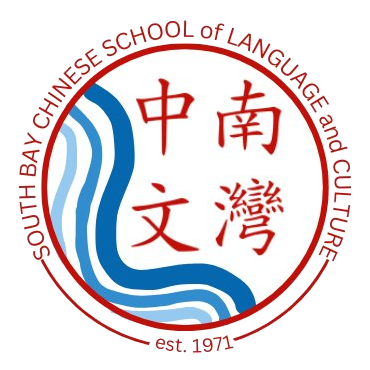
Frequently Asked Questions
South Bay Chinese Culture Association is a non-profit, non-sectarian and non-political organization committed to serve the South Bay residents by teaching and promoting the richness of Chinese culture, language and arts.
- What is your minimum age requirement for enrollment?
- Which Chinese language programs do you offer?
- Can we listen in on a class before registering?
- How and when can I register my child?
- We are interested in enrolling, but are very worried about how it will work with the kids’ sport and school activities on Saturdays.
- Is there any way to join classes far into a school year?
- Where can I find your calendar online?
- When are the classes held?
- What is the difference between the fall semester and the full year?
- Do you have Mandarin classes for beginners?
- My child is a beginner; please explain the difference between Mandarin Conversation (MC) and core Chinese (LK/HLK/C1) classes?
- What is the difference between LK (Level Kindergarten) and HLK (Hanyu Pinyin 漢語拼音 Level Kindergarten)?
- We are Cantonese, but our goal is for our kids to know both Mandarin and Cantonese. Should we enroll in the Cantonese series first or go straight to the Mandarin track?
- What is L4 AP, L5AP, and Advanced Class? What happened to L5, L6, L7, L8?
- Are there parent volunteer requirements?
- Why do you require tuition payment all at once?
- What are the tuition & fees?
What is your minimum age requirement for enrollment?
The minimum age for enrollment is 5 years old. If you have a TK student who will turn 5 in the fall, that may also be acceptable.
Which Chinese language programs do you offer?
We currently offer Mandarin (會話, 简体, 繁體 / Hanyu, Simplified, and Traditional) and Cantonese.
We are currently considering offering a Hokkien (台語 / 閩南話) conversation class for Fall 2025 if there is enough interest. Please fill out our interest form if you’d like to join our Hokkien conversation class!
Can we listen in on a class before registering?
Yes. You are welcome to sit in on one class before registering. Please contact us at sbcs00pta@gmail.com to inquire about sitting in a class.
How and when can I register my child?
Please enroll on this website by clicking the “Register” link in the top navigation. We accept registration throughout the school year. For questions regarding the placement assessment of your child in a specific class, please e-mail sbcs00pta@gmail.com.
We are interested in enrolling, but are very worried about how it will work with the kids’ sport and school activities on Saturdays.
You have a very common concern with most other parents. Over the past 50+ years, our school has co-existed with thousands of very busy South Bay families. Our teachers are very experienced and flexible; they work with your family to help your kid(s) succeed, in the amount of time he/she can attend to Chinese learning.
Is there any way to join classes far into a school year?
Yes, we have open enrollment, and our teachers are very experienced and flexible in fitting new students into the classes.
Where can I find your calendar online?
Please click on “Calendar”, on the upper right hand corner on the top menu of our homepage, to view the most up-to-date calendar.
When are the classes held?
Classes are typically held Saturdays from 9 am to noon.
What is the difference between the fall semester and the full year?
We run two 16-weeks semesters a year. Fall semester goes from late August to mid January. Spring semester runs from Mid-Jan to early June. Each class is progressive, and one textbook will be covered per 2 semesters. See Q.4 for school calendar.
Do you have Mandarin classes for beginners?
Yes, the Mandarin Conversation 國語會話 (MC) class is designed for beginners of all ages. The idea is to learn Chinese through natural discussion. The class provides opportunities for you to interact and internalize the new skill with a language “partner.” Please take advantage of the open enrollment policy and join in anytime.
My child is a beginner; please explain the difference between Mandarin Conversation (MC) and core Chinese (LK/HLK/C1) classes?
Our Mandarin Conversation class is designed for students with no exposure to Mandarin Chinese at home. Its main focus is listening and speaking, but also incorporates character recognition and some writing. The Mandarin Conversation class uses material from Better Chinese http://www.betterchinese.com. My First Chinese Words My First Chinese Readers are used.
In contrast, students in the core Chinese classes focus on reading and writing as much as listening and speaking. The curriculum is intended for heritage learners living in a household with native Chinese speakers. Students should be able to understand conversational Mandarin Chinese and speak at least some Mandarin Chinese. They advance throughout the curriculum with the same classmates from kindergarten to Advanced. The core Chinese classes use material from Meizhou Chinese http://www.mzchinese.net. Integrated Chinese is also used for middle school students so that they are prepared for the high school Chinese placement test should they choose Chinese as their foreign language in high school.
Motivated students who graduate from our Mandarin conversation classes can join the core classes when they are ready.
What is the difference between LK (Level Kindergarten) and HLK (Hanyu Pinyin 漢語拼音 Level Kindergarten)?
LK is for you if you are interested in learning traditional Chinese characters to write, and using the zhuyin注音 technique (bo po mo fo) to pronounce the words. HLK is for you if you are interested in using simplified Chinese characters to write, and using the pinyin 拼音 style to pronounce the words. Although some may consider one method “easier” or “more popular” than the other, most students are an “open book” and they will adjust well in either method. We recommend that your family evaluates both classes to find a better match for YOU.
We are Cantonese, but our goal is for our kids to know both Mandarin and Cantonese. Should we enroll in the Cantonese series first or go straight to the Mandarin track?
Our school is the only school in the South Bay to offer Cantonese classes 廣東話 班, which are taught by seasoned teachers. Besides having ample of chances to speak and learn in Cantonese, the unique and very effective curriculum helps students build an unusually strong vocabulary base, reading and writing in traditional characters. So, as they transition to the Mandarin track, they can then focus primarily in listening and pronunciation. We recommend that your family evaluates both classes to find a better match for YOU.
What is L4 AP, L5AP, and Advanced Class? What happened to L5, L6, L7, L8?
In the spring of 2024, we tested all of our Mandarin students L3 and up and found that students in upper levels tend to learn the material from L1 to L3 well, but forget much of what is learned in L4 and higher. In addition, we have found that students who learn the material in L1 through L5 well and retain it do very well on the Chinese placement test for high school and can be ready for AP Chinese as high school freshmen.
The material presented in Meizhou Chinese 4 and higher includes more specialized vocabulary that may not be used in daily household conversation, and thus, may be harder to remember. Instead of students progressing from one level to the next without learning the material well, the teachers and principals decided to formulate a new curriculum for the higher levels. The goal is to learn the content in MZ Chinese 4 and 5 well and retain it, while also attending to the differing needs of students from Chinese speaking households and those from English speaking households.
To accomplish this goal, after completing 1 year of MZ Chinese 4 in L4, students will spend the next year in L4AP. Likewise, after completing 1 year of MZ Chinese 5 in L5, students will spend the next year in L5AP. In the L4AP & L5AP classes, students will use the Chinese they have already learned and use it in class in a practical way, speaking, reading, listening, doing oral cultural presentations, and writing stories based on pictures. This is based on the MZ Chinese SAT & AP Preparation book. Teachers and TA’s can work with individual students who need help with speaking to improve their speaking abilities. Likewise, they can work with individual students who are adept at speaking and help them improve their essay writing skills. The exercises done in class are modeled after the Chinese AP test format and will also help students who eventually take Chinese AP in high school. Homework will consist of recording oral presentations and also typing up the written work students have worked on in class and will thus hone Chinese typing skills. This can also serve as a good supplement to students who are taking Chinese concurrently in middle school and even high school.
The Advanced class for 2024-2025 will use Integrated Chinese 3, MZ Chinese 7 AP prep, and the Barron’s AP Chinese prep book. This class will be taught with AP style exercises. This class will prepare students for the AP Chinese exam, as well as to take the high school Chinese placement exam and place into Chinese 4/AP.
The classes planned for 2024-2025 reflect the projected needs of returning students from the 2023-2024 school year. Thus, there is no L5 or L6 class. If enrollment in the summer is different than expected, adjustments may be made. The classes planned in 2025-2026 may shift depending on the experience of the 2024-2025 school year with this new curriculum.
The teachers and principals are unified and excited about this curriculum change, as we believe it will be greatly beneficial to our students in their Chinese learning journey.
Are there parent volunteer requirements?
SBCS is a volunteer and parent run organization. Parents are required to complete at least 2 volunteer activities and attend at least 2 out of 3 parent association (PA) meetings during the academic year. If you are unable to attend a PA meeting, you can make up each missed PA meeting by attending a board meeting.
All families will be required to pay a $300 deposit (1 deposit per family). This includes $50 for each PA Meeting and $100 for each volunteer activity. It will be refunded to you at the end of the school year if you have completed all the PA meeting & volunteer activity requirements.
If paying this deposit upfront presents financial hardship for you, you can submit a postdated check for June 1, 2025 for deposit that will be destroyed at the end of the school year if you fulfill your requirements. Please e-mail sbcs00pta@gmail.com if this is the case for you.
Why do you require tuition payment all at once?
Our experience is that developing a language skill requires frequent interaction. Families do find it necessary, and very helpful, to stay with our school more than 1 semester. With the tuition set at a very affordable rate (~ $14/hr), the once a year tuition collection was voted in as a necessary measure to streamline the time & effort required given the limited numbers of resources on hand to process new registration and payments.
If paying the full year of tuition & fees upfront presents financial hardship for you, please e-mail sbcs00pta@gmail.com to work out a payment plan.
What are the tuition & fees?
Tuition is $1350 for a 32 week school year. There is also a $40 parent association fee for each student. Each family is required to purchase at least 1 yearbook, which is $40. Depending on the class, textbook charge is $20-$40. Some classes will buy their own textbooks.
